Concern over civilian toll in Afghan conflict
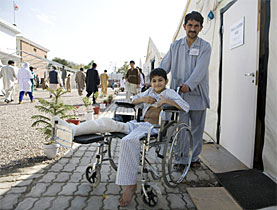
More ordinary Afghans and Pakistanis will bear the brunt of a likely escalation in the war in Afghanistan this year, says a top Red Cross official.
The warning comes on the eve of a United Nations conference on Afghanistan in the Netherlands on Tuesday and just days after US President Barack Obama outlined a new strategy for fighting Taliban insurgents in the volatile region.
The Swiss-run International Committee of the Red Cross (ICRC) on Monday urged the US and others to consider the plight of civilians in Afghanistan and in northwestern Pakistan “as a matter of urgency”.
“Too many civilians have been killed, maimed, humiliated, wounded and then not treated,” Jacques de Maio, head of ICRC operations for South Asia, told journalists in Geneva.
“There is no such thing as a clean war and both what’s going on in Afghanistan and in Pakistan right now is an ample demonstration of that… the impact on civilians is too high and can be minimized.”
The ICRC is one of the few aid agencies able to operate in hostile tribal areas on both sides of the border because of long-running relations, including with Taliban-linked militants.
Violence had reached “stunning and dramatic levels” and the conflict, involving a “complex constellation” of political and military actors, would continue to intensify and expand in 2009, said de Maio.
On the Pakistan side, the escalating conflict is forcing many people to flee their homes, and a 50 per cent rise in civilian casualties at ICRC hospitals in Quetta and Peshawar over the past year.
The Geneva-based organisation said it had assisted 40,000 displaced people in Pakistan border regions last year, and was gearing up to deal with 140,000 in 2009.
The ICRC has doubled its budget for Pakistan to SFr52.6 million ($46 million) and is sending more aid workers there and to Afghanistan.
“We expect more war-wounded. We expect more civilians being displaced,” said de Maio.
“New comprehensive strategy”
The ICRC statement comes just days after the new US president announced a “comprehensive new strategy” for the war in Afghanistan after a two-month policy review, aimed at destroying the Taliban and Al-Qaida elements there and in neighbouring Pakistan.
In his White House speech on Friday, Obama painted a bleak picture saying the Afghanistan-Pakistan border was the most dangerous place in the world.
He said an extra 4,000 US troops would train and strengthen the Afghan army and police, and he would also provide support for civilian development.
Obama last month ordered 17,500 US combat troops to Afghanistan to reinforce the 38,000 already there. US military commanders are concerned that these will not be enough, anticipating a big Taliban push ahead of the country’s August election.
In addition to the renewed focus on Afghanistan, the US is also stepping up pressure on Pakistan to tackle Taliban and al-Qaida safe havens, alongside a $7.5 billion (SFr8.64 billion) programme of “direct support”. But Obama has ruled out deploying American troops there.
The last element of the policy is to try to engage Afghanistan’s regional neighbours, Russia and Iran, in helping to pacify Afghanistan.
Turning point?
Both Pakistan and Afghanistan said they welcomed the new strategy. And prior to Obama’s speech Russian President Dmitry Medvedev told the BBC that Moscow was “ready to participate in the efforts directed at putting things in order” in Afghanistan.
But Mohammad-Reza Djalili, an Afghanistan-Pakistan expert at Geneva’s Graduate Institute, cast doubt on the new policy.
“Does it represent a turning point in the conflict? It’s hard to say right now. The Soviet Union lost the war in Afghanistan with 100,000 men,” Djalili told swissinfo.
The US is paying the price for a strategic error made by George W. Bush, he explained.
“Instead of reinforcing its position in Afghanistan in 2003, it decided to go to war in Iraq,” said the Geneva professor.
“In certain regions of the south the Taliban has an impressive presence,” he said. “They have understood the limited capabilities of modern weapons to deal with guerrilla warfare.”
Obama’s strategy is risky, said Djalili, as he talks about getting more involved, but also raises the idea of planning for an eventual withdrawal, which could give the Taliban fresh impetus.
Djalili said it was crucial for the US-led forces to avoid collateral damage, which could harm their image among the local Afghan and Pakistani people, and efforts should be made to help rebuild the Afghan economy and institutions. Regional cooperation could also help “limit the damage”.
“There is no end to the conflict in sight,” he said. “All we can hope for are small improvements and for the situation to stabilise somewhat.”
swissinfo, Simon Bradley in Geneva
Participants at the UN conference on Afghanistan in The Hague, Netherlands, on Tuesday include US Secretary of State Hillary Clinton, UN Secretary General Ban Ki-moon and Afghan President Hamid Karzai, along with the foreign ministers of the Netherlands, Japan and Australia.
Nearly 90 countries are participating, including delegates from Russia, China and Pakistan.
The US is expected to seek support for its strategy, although organisers say the one-day conference is not about the implementation of the US plan.
Organisers also say it will focus on regional cooperation rather than seeking extra troops or money for Afghanistan.
After their rapid collapse in the face of the US-led intervention following the September 11, 2001, terrorist attacks in the US, the Taliban and their allies regrouped and launched an insurgency which has now spread from the south and east to the outskirts of the Afghan capital and to northwest Pakistan. The US describes the situation in Afghanistan as “increasingly perilous”.
Violence in Afghanistan surged last year with about 5,000 people killed, including more than 2,100 civilians, a 40 per cent increase on the previous year, the United Nations says.
In 2008 55 per cent of civilians killed died at the hands of Taliban insurgents and their allies, while a quarter of all civilian casualties, 552 people, died as a result of air strikes by US and Nato-led forces in Afghanistan.
President Barack Obama has ordered 17,500 additional US troops to Afghanistan to bolster around 70,000 foreign troops, including 38,000 U.S. soldiers already in the country fighting a resurgent Taliban.
Although more reluctant than the United States, Nato countries are also expected to send some more troops this year to help provide security for Afghanistan’s presidential election in August.
The Swiss Agency for Development and Cooperation (SDC) has been in Afghanistan since 1977.
Since 2004, the Swiss programme has been gradually changed into a long-term programme aimed at development and reconstruction.
Its current activities are aimed at encouraging good governance, respect of human rights and improving the standard of living of the poorest groups in the community.
Switzerland will allocate about SFr15 million per year to Afghanistan between 2008-2011.
The Swiss defence ministry withdrew the Swiss officers attached to Nato forces in 2007. Until then there had been between two and four officers.

In compliance with the JTI standards
More: SWI swissinfo.ch certified by the Journalism Trust Initiative

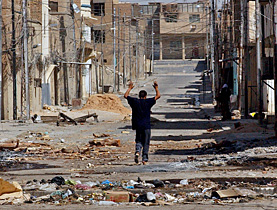
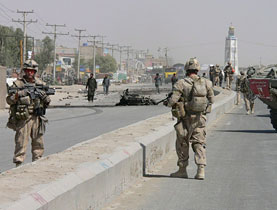
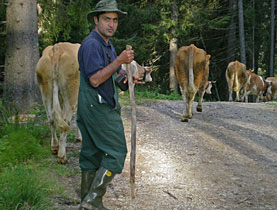
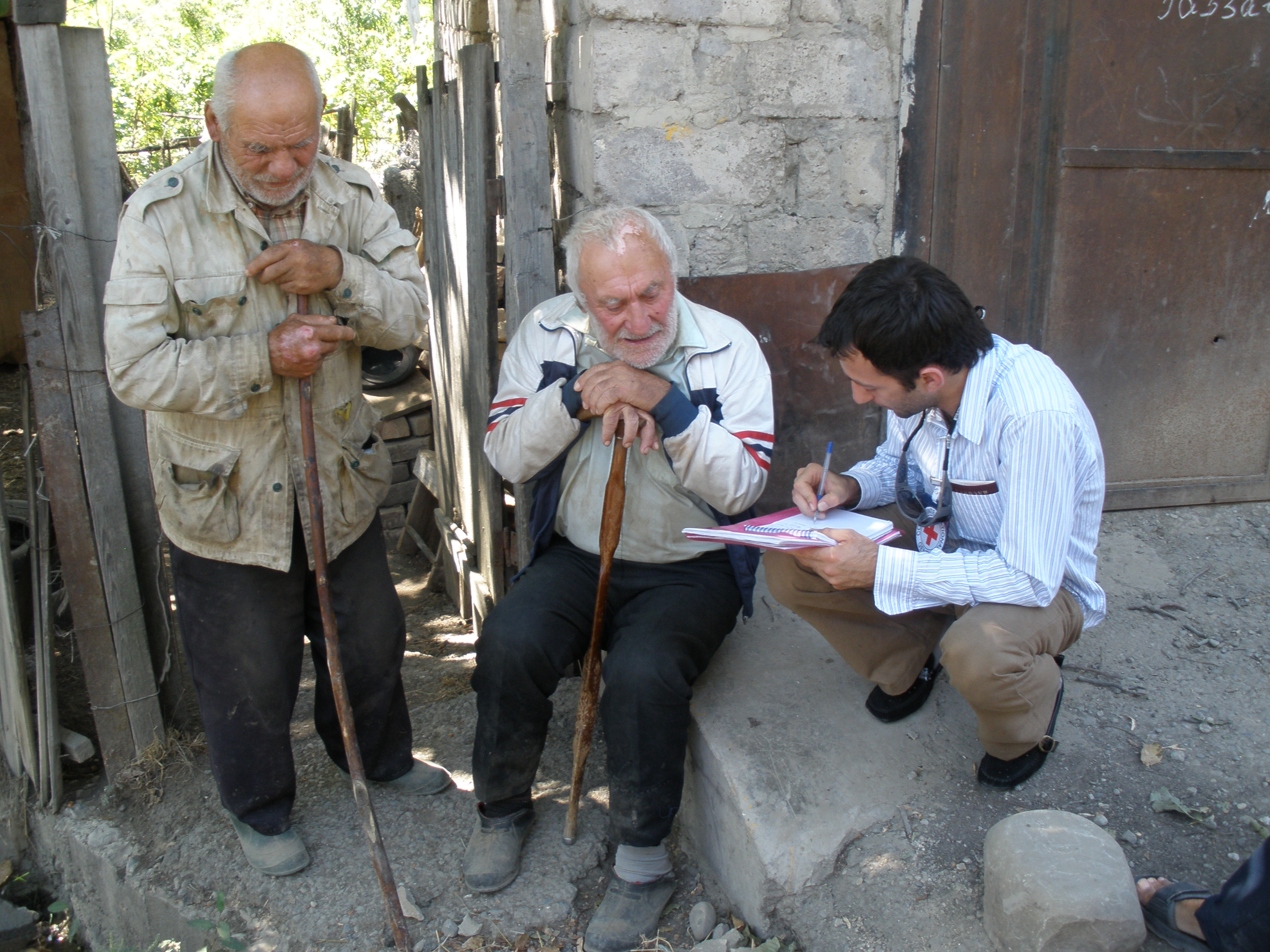
You can find an overview of ongoing debates with our journalists here . Please join us!
If you want to start a conversation about a topic raised in this article or want to report factual errors, email us at english@swissinfo.ch.